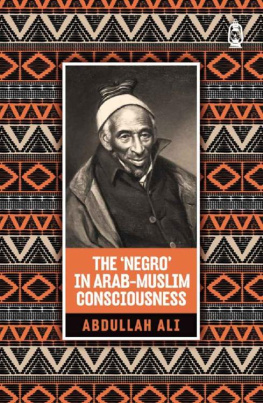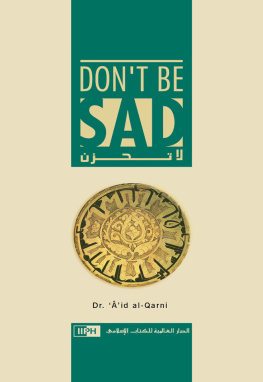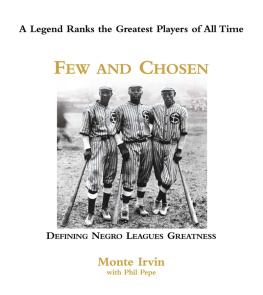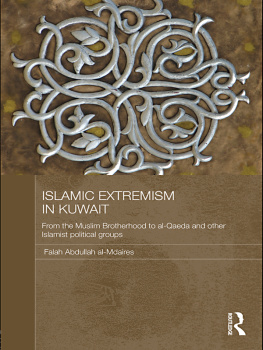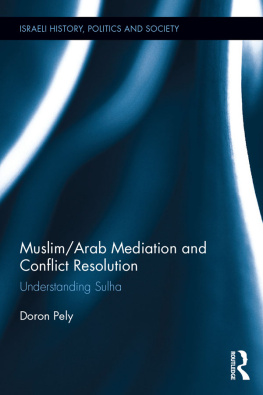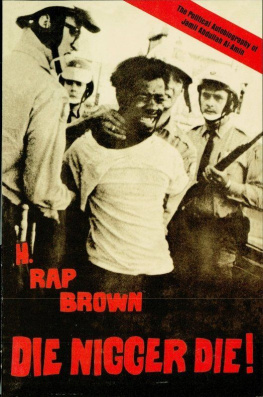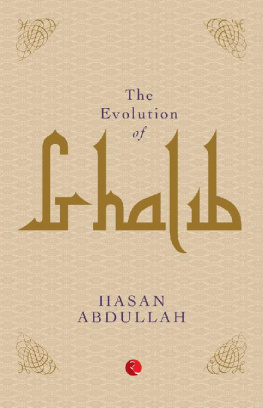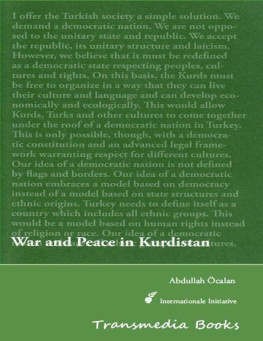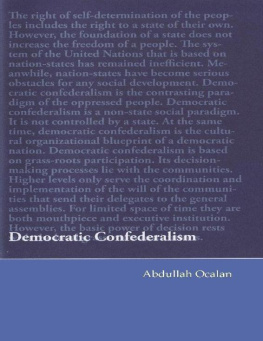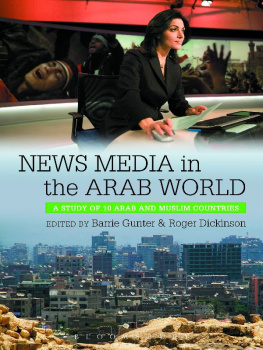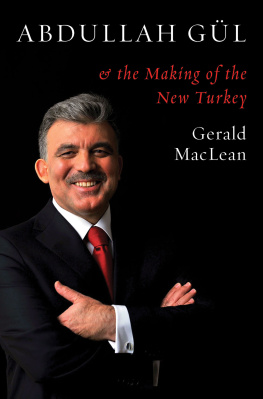Abdullah Ali - The Negro in Arab Muslim Consciousness
Here you can read online Abdullah Ali - The Negro in Arab Muslim Consciousness full text of the book (entire story) in english for free. Download pdf and epub, get meaning, cover and reviews about this ebook. year: 2019, publisher: Claritas Books, genre: Religion. Description of the work, (preface) as well as reviews are available. Best literature library LitArk.com created for fans of good reading and offers a wide selection of genres:
Romance novel
Science fiction
Adventure
Detective
Science
History
Home and family
Prose
Art
Politics
Computer
Non-fiction
Religion
Business
Children
Humor
Choose a favorite category and find really read worthwhile books. Enjoy immersion in the world of imagination, feel the emotions of the characters or learn something new for yourself, make an fascinating discovery.
- Book:The Negro in Arab Muslim Consciousness
- Author:
- Publisher:Claritas Books
- Genre:
- Year:2019
- Rating:5 / 5
- Favourites:Add to favourites
- Your mark:
- 100
- 1
- 2
- 3
- 4
- 5
The Negro in Arab Muslim Consciousness: summary, description and annotation
We offer to read an annotation, description, summary or preface (depends on what the author of the book "The Negro in Arab Muslim Consciousness" wrote himself). If you haven't found the necessary information about the book — write in the comments, we will try to find it.
The Negro in Arab Muslim Consciousness — read online for free the complete book (whole text) full work
Below is the text of the book, divided by pages. System saving the place of the last page read, allows you to conveniently read the book "The Negro in Arab Muslim Consciousness" online for free, without having to search again every time where you left off. Put a bookmark, and you can go to the page where you finished reading at any time.
Font size:
Interval:
Bookmark:


2 3 4 5 6 7 8 9 10
CLARITAS BOOKS
Bernard Street, Swansea, United Kingdom
Milpitas, California, United States

CLARITAS BOOKS 2018
This book is in copyright. Subject to statutory exception and to the provisions of relevant collective licensing agreements, no reproduction of any part may take place without the written permission of Claritas Books.
First Published in December 2018
Typeset in Minion Pro 14/11
The Negro in Arab-Muslim Consciousness by Abdullah bin Hamid Ali
A CIP catalogue record for this book is available from the British Library
ISBN: 978-1-905837-62-5

FOR YOU,
MOM AND DAD.
REST IN PEACE
Abdullah bin Hamid Ali is the Founding Director of the Lamppost Education Initiative. He serves as an assistant professor of Islamic law and Prophetic Tradition at Zaytuna College in Berkeley, California (2007-present). He holds a PhD. in Cultural and Historical Studies in Religion (2016) and an MA in Ethics and Social Theory (2012) from the Graduate Theological Union. He obtained his BA (ijaza ulya) in Islamic Law (Shariah) from the prestigious Al-Qarawiyin University of Fes, Morocco in 2001. He also served as full time Islamic chaplain at the State Correctional Institute of Chester, PA from 2002-2007. His research interests include the interconnection between law and identity formation, comparative Islamic law, and Islams role in the modern world.

ACKNOWLEDGEMENT
I would like to take this time to express my immense gratitude to a number of people without which this project would have not come to completion: to Dr. Munir Jiwa and Professor Judith Berling of the Graduate Theological Union for advising me and helping me to improve my writing and research during my graduate studies; To Dr. Hatem Bazian and Dr. Sherman Jackson for reading my manuscripts and making helpful suggestions to make the book more coherent. To Sharif Banna and Wali-ur Rahman of Claritas Books for deciding to publish my writings and patiently endure my last-minute requests for changes; to my wife Siham for her patience with me throughout our marriage, studies, work, and travels; and to everyone else who offered encouragement over the years. May Allah not deprive any of you of your rewards.

CONTENTS

INTRODUCTION
Every religious community struggles to maintain a balance between religious ideals and socio-historical realities. While the sages seem to embody all the good a given religion has to offer, efforts to prove that ones religion plays a major role in ones ethical formation and civilisational accomplishments are frustrated every time we witness savagery and injustice justified in the name of a given religion. For Islam, more than any other religion today, this challenge is particularly difficult to overcome in light of a number of negative stereotypes. Islams exemplar par excellence is the Prophet Muhammad, who is for Muslims the universal symbol of human perfection. It is his ethos that committed Muslims seek to embody.
The reality is that no single factor independently contributes to the ethical formation of a given person; so reducing the cause of a phenomenon like violence to mere religious or militant ideology is intellectually lazy, to say the least. Theology can, undoubtedly, have a positive or negative influence on a persons conduct, but that is insufficient to explain a given persons primal motivations for acting. It is precisely for this reason that Prophet Muhammad said, You will find that people are precious metals. The best of them in pre-Islamic ignorance will be the best of them in Islam once they become learned. In other words, to the extent of ones predilection toward virtue prior to accepting Islam he/she will excel in virtue as a Muslim. In contrast, if one is of marginal virtue prior to Islam, knowledge of the religion should ameliorate ones ethical state. But, if one forsakes the pursuit of spiritual knowledge after conversion, one is likely to fall victim to ones own vices. For this reason, the Quran says, And we send down from the Quran what is a cure and mercy for the believers, while it only increases the wrongdoers in ruin (Q 17:82).
These introductory remarks are meant to provide a context for understanding one of the goals of this book, which is to humanize classical Muslim scholars. For if we do not acknowledge that learned sages and clergymen are also susceptible to scriptural misinterpretation, we will be guilty of committing gratuitous violence against them when we decide that they are unreliable receptacles of wisdom in light of the discovery of personal bias and prejudice. Or we will too readily accept their problematic statements.
Perhaps, no other area more seriously reflects this challenge than antipathy toward people with black skin. To highlight this concern, I entitled this book, The Negro in Afro-Arabian Muslim Consciousness. The assertion is that the Negro and the African are not completely conterminous from the standpoint of anthropological classification. Certainly, the term Negro has been utilised in America to refer to any person dis covered as possessing any degree of sub-Saharan/black African heritage. We know, however, that the Sahara is merely a part of the African continent, and its surrounding inhabitants represent only a portion of its people. In addition, for the early Arabs and other Muslims, both the idea of a continent and one bordering Arabia called Africa would have been unfamiliar territory. The only Africa that any of them would have been familiar with would have been Ifriqiya; that is the northwestern sector (Libya, Algeria, Tunisia), a name popularised during the Roman Empires rule of that region.
The term negro is believed to have come into use in English during the Transatlantic slave trade as a convenient way to describe uncivilised sub-Saharan blacks, especially those who were enslaved. The Arabic-English lexicographers, Hans Wehr This is despite the fact that the terms history extends well beyond the creation of the English word, negro. So, to consider them to be perfect synonyms may appear to be inappropriately retroactive and anachronistic. There is, however, good reason to consider this translation to be fitting.
The 14th century Egyptian Arabic lexicographer, Amad b. Muammad al-Fayym (d. 1368 CE), in his lexicon, Al-Mib Al-Munr, defines the Zanj people as,
A group of blacks (al-Sudan) who live below the equator and south of it. Beyond them there is no civilisation. Some have said: Their lands extend from the Maghrib (in the western coast) to close to Ethiopia. And some of their lands are located upon the Nile of Egypt.
This definition provides us with both location and physical description of the inhabitants of this region. Firstly, we know that the
Next pageFont size:
Interval:
Bookmark:
Similar books «The Negro in Arab Muslim Consciousness»
Look at similar books to The Negro in Arab Muslim Consciousness. We have selected literature similar in name and meaning in the hope of providing readers with more options to find new, interesting, not yet read works.
Discussion, reviews of the book The Negro in Arab Muslim Consciousness and just readers' own opinions. Leave your comments, write what you think about the work, its meaning or the main characters. Specify what exactly you liked and what you didn't like, and why you think so.

